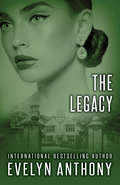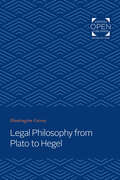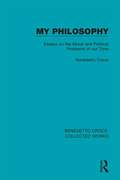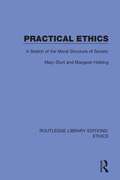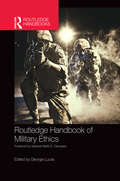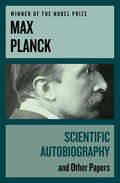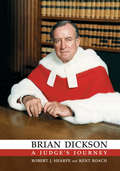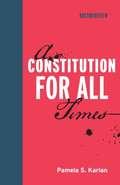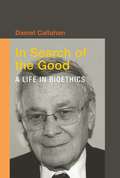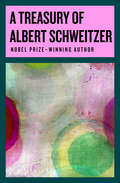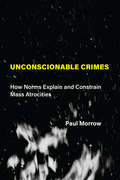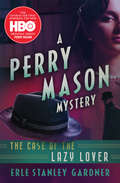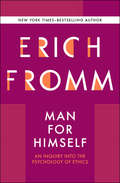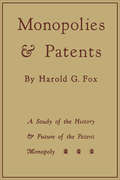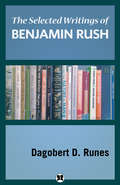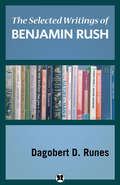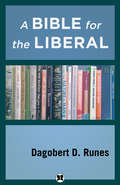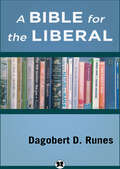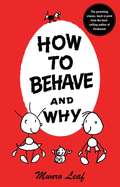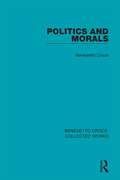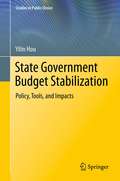- Table View
- List View
The Legacy
by Evelyn AnthonyWhen Christina Nordohl meets wealthy English widower, Richard Farrington, in Stockholm, it changes her life. They fall in love, and she returns to England with him as his wife. On his death twelve years later, Richard bequeaths Christina and her young daughter a great house, land, money, and a priceless Hebrew manuscript. But Richard's legacy comes with a downside in the form of his turbulent, hate-filled son, Alan, who has been disinherited. At his father's funeral he announces that he will contest the will, and has discovered something that will tear Christina and her daughter's world apart. Among the team defending Christina is the cold and sinister Swede, Rolf Wallberg--what is his real motive for taking the case? Christina neither likes nor trusts him. But neither of them can resist the force that brings them together.
Legal Philosophy from Plato to Hegel
by Huntington CairnsOriginally published in 1949. Huntington Cairns identifies the views that major Western philosophers took on law, the problems they considered significant about law, and the nature of the solutions they proposed. This book develops ideas discussed in Cairns' Law and the Social Sciences (1935) and Theory of Legal Science (1941). The object of these three volumes is the same: to construct the foundation of a theory of law that is the necessary antecedent to a possible jurisprudence. The inventory of philosophers that Cairns examines includes Plato, Aristotle, Cicero, Aquinas, Hobbes, Spinoza, and Hegel.
My Philosophy: Essays on the Moral and Political Problems of our Time (Collected Works)
by Benedetto CroceOriginally published in 1949, Croce’s essays on political, philosophic and aesthetic subjects, selected from both his earlier and later writings possess a remarkable underlying unity. The political essays which form a major part of this volume display a criticism, either direct or implied of the mass creeds and movements that subordinate the individual to history. They combine a passionate belief in liberty with critical and historical judgment.
Practical Ethics: A Sketch of the Moral Structure of Society
by Mary Sturt Margaret HoblingOriginally published in 1949, this book covers both psychological and sociological aspects of moral life in Western society in the first half of the 20th Century and the historical influences on its thinking and way of behaviour. It discusses education, art, social structure, law and religion and ethical failure.
Routledge Handbook of Military Ethics
by George LucasThe Routledge Handbook of Military Ethics is a comprehensive reference work that addresses concerns held in common by the military services of many nations. It attempts to discern both moral dilemmas and clusters of moral principles held in common by all practitioners of this profession, regardless of nation or culture. Comprising essays by contributors drawn from the four service branches (Army, Navy, Air Force, and Marine corps) as well as civilian academics specializing in this field, this handbook discusses the relationship of "ethics" in the military setting to applied and professional ethics generally. Leading scholars and senior military practitioners from countries including the US, UK, France, China, Australia and Japan, discuss various national cultural views of the moral dimensions of military service. With reference to the responsibilities of professional orientation and education, as well as the challenges posed by recent technological developments, this handbook examines the difficulties underpinning the fundamental framework of military service. This book will be of much interest to students of military studies, war theory, ethics philosophy, sociology, war and conflict studies, and security studies.
Scientific Autobiography: And Other Papers
by Max PlanckIn this fascinating autobiography from one of the foremost geniuses of twentieth-century physics, Max Planck tells the story of his life, his aims, and his thinking. Published posthumously, the papers in this volume were written for the general reader and make accessible Planck&’s scientific theories as well as his philosophical ideals, including his thoughts on ethics and morals.
Scientific Autobiography: And Other Papers
by Max PlanckIn this fascinating autobiography from one of the foremost geniuses of twentieth-century physics, Max Planck tells the story of his life, his aims, and his thinking. Published posthumously, the papers in this volume were written for the general reader and make accessible Planck&’s scientific theories as well as his philosophical ideals, including his thoughts on ethics and morals.
Brian Dickson
by Kent Roach Robert J. SharpeWhen Brian Dickson was appointed in 1973, the Supreme Court of Canada was preoccupied with run-of-the-mill disputes. By the time he retired as Chief Justice of Canada in 1990, the Court had become a major national institution, very much in the public eye. The Court's decisions, reforming large areas of private and public law under the Charter of Rights, were the subject of intense public interest and concern.Brian Dickson played a leading role in this transformation. Engaging and incisive, Brian Dickson: A Judge's Journey traces Dickson's life from a Depression-era boyhood in Saskatchewan, to the battlefields of Normandy, the boardrooms of corporate Canada and high judicial office, and provides an inside look at the work of the Supreme Court during its most crucial period. Dickson's journey was an important part of the evolution of the Canadian judiciary and of Canada itself. Sharpe and Roach have written an accessible biography of one of Canada's greatest legal figures that provides new insights into the work of Canada's highest court.
The Case of the Lonely Heiress
by Erle Stanley GardnerPerry Mason is hired to find the identity of an "heiress" who ran ads in a lonely hearts magazine. Later, he defends the heiress against a murder charge.
The Case of the Vagabond Virgin
by Erle Stanley GardnerProminent businessman John Addison persuades Perry Mason to spring Veronica Dale, a sweet young thing, from the local jail where she was locked up overnight for vagrancy. Once her release is arranged, however, Mason discovers that this innocent-looking girl, who is new in town, is part of an elaborate blackmail plot and wanted for murder.
A Constitution for All Times
by Pamela S. KarlanPamela S. Karlan is a unique figure in American law. A professor at Stanford LawSchool and former counsel for the NAACP, she has argued seven cases at the Supreme Court and workedon dozens more as a clerk for Justice Harry Blackmun. In her first book written for a generalaudience, she examines what happens in American courtrooms -- especially the Supreme Court -- andwhat it means for our everyday lives and to our national commitments to democracy, justice, andfairness. Through an exploration of current hot-button legal issues -- fromvoting rights to the death penalty, health care, same-sex marriage, invasive high-tech searches, andgun control -- Karlan makes a sophisticated and resonant case for her vision of the Constitution. Atthe heart of that vision is the conviction that the Constitution is an evolving document thatenables government to solve novel problems and expand the sphere of human freedom. As skepticscharge congressional overreach on such issues as the Affordable Care Act and even voting rights,Karlan pushes back. On individual rights in particular, she believes the Constitution allowsCongress to enforce the substance of its amendments. And she calls out the Roberts Court for itsdisdain for the other branches of government and for its alignment with a conservativeagenda.
In Search of the Good
by Daniel CallahanDaniel Callahan helped invent the field of bioethics more than forty years ago when he decided to use his training in philosophy to grapple with ethical problems in biology and medicine. Disenchanted with academic philosophy because of its analytical bent and distance from the concerns of real life, Callahan found the ethical issues raised by the rapid medical advances of the 1960s--which included the birth control pill, heart transplants, and new capacities to keep very sick people alive--to be philosophical questions with immediate real-world relevance. In this memoir, Callahan describes his part in the founding of bioethics and traces his thinking on critical issues including embryonic stem cell research, market-driven health care, and medical rationing. He identifies the major challenges facing bioethics today and ruminates on its future. Callahan writes about founding the Hastings Center--the first bioethics research institution--with the author and psychiatrist Willard Gaylin in 1969, and recounts the challenges of running a think tank while keeping up a prolific flow of influential books and articles. Editor of the famous liberal Catholic magazine Commonweal in the 1960s, Callahan describes his now-secular approach to issues of illness and mortality. He questions the idea of endless medical "progress" and interventionist end-of-life care that seems to blur the boundary between living and dying. It is the role of bioethics, he argues, to be a loyal dissenter in the onward march of medical progress. The most important challenge for bioethics now is to help rethink the very goals of medicine.
A Treasury of Albert Schweitzer
by Albert SchweitzerCollected here in a single volume are the most important philosophical writings of Albert Schweitzer, one of the greatest thinkers and humanitarians of our time. Carefully chosen from among his many written works, the selections in this anthology illuminate and amplify Dr. Schweitzer&’s cardinal principle of belief—a reverence for life. Among the important and revealing works included are &“Pilgrimage to Humanity,&” which outlines his philosophy of culture, the early influences in his life, and his ideal of world peace; &“The Light Within Us,&” one of the twentieth century&’s most significant and beautiful statements of one man&’s faith in his fellow man; and &“Reverence for Life,&” which states, with great clarity and conviction, the essence of Schweitzer&’s wisdom. Because of his legendary fame as a medical missionary, other equally important and outstanding aspects of Schweitzer&’s life are not as well known. Readers of this book will realize that Albert Schweitzer was a truly creative thinker, whose concern with the problems of the human spirit and whose methods of expressing this concern have raised him to the stature of one of the world&’s foremost philosophers.
Unconscionable Crimes: How Norms Explain and Constrain Mass Atrocities
by Paul C. MorrowThe first general theory of the influence of norms--moral, legal and social--on genocide and mass atrocity.How can we explain--and prevent--such large-scale atrocities as the Holocaust? In Unconscionable Crimes, Paul Morrow presents the first general theory of the influence of norms--moral, legal and social--on genocide and mass atrocity. After offering a clear overview of norms and norm transformation, rooted in recent work in moral and political philosophy, Morrow examines numerous twentieth-century cases of mass atrocity, drawing on documentary and testimonial sources to illustrate the influence of norms before, during, and after such crimes.
The Case of the Lazy Lover (The Perry Mason Mysteries #1)
by Erle Stanley GardnerA runaway witness leads a lawyer into a whodunit: &“The only dull pages in this book are the blank ones&” (The New York Times). Defense lawyer Perry Mason is surprised to receive two checks from a stranger named Lola Allred. And when he speaks with Lola&’s husband, he discovers the woman has run off with her daughter&’s boyfriend—who happens to be an important witness in a lawsuit. Soon Mason&’s caught up in a complicated case involving not only a missing witness but forgery and murder as well . . . This mystery is part of Edgar Award–winning author Erle Stanley Gardner&’s classic, long-running Perry Mason series, which has sold three hundred million copies and serves as the inspiration for the HBO show starring Matthew Rhys and Tatiana Maslany. DON&’T MISS THE NEW HBO ORIGINAL SERIES PERRY MASON, BASED ON CHARACTERS FROM ERLE STANLEY GARDNER&’S NOVELS, STARRING EMMY AWARD WINNER MATTHEW RHYS
The Case of the Lazy Lover
by Erle Stanley GardnerCriminal attorney Perry Mason receives two retainer checks by mail--both are signed by Lola Allred, but one is forged. Unfortunately, Lola disappears, and her husband claims she has run away with his best friend, Robert Fleetwood. Perry tracks down Lola just as she is implicated in a murder.
Man for Himself: An Inquiry Into the Psychology of Ethics (Routledge Classics Ser.)
by Erich Fromm&“There is no meaning to life except the meaning man gives his life by the unfolding of his powers.&” —Erich FrommAre we primarily determined by nature or nurture? What are the best ways that people can live productively? In Man for Himself, renowned social philosopher Erich Fromm posits: With the gifts of self-consciousness and imagination, any individual can give his or her own unique answer. This answer is rooted in our human nature, and should correspond to mankind&’s powers of reason and love. Therefore, Fromm reasons, &“living itself is an art.&” In his humanistic concept of man, Fromm describes various character orientations that are to be found in Western culture. For the first time, Fromm analyzes the parallels between economic concepts of market value and how we value others and ourselves—the idea of personality as a commodity. He argues for a return to humanistic ethics, and discusses issues such as the question of conscience, of selfishness and self-love, and of pleasure and happiness. This ebook features an illustrated biography of Erich Fromm including rare images and never-before-seen documents from the author&’s estate.
Monopolies and Patents: A Study of the History and Future of the Patent Monopoly
by Harold G. FoxHarold G. Fox is a native of Toronto and a graduate of the University of Toronto and the Law School of Osgoode Hall. For some years he practised patent and trade mark law as a member of the firm of Fetherstonhaugh & Fox. In the nineteen-twenties he was invited to take over the management of the Canadian zipper industry and, since that time, has devoted his main energies to the development of that business. But, while he is identified today as a competent industrial executive, he is also recognized as an authority in his special field of patent, trade mark, and copyright law, in which he has continued to take a deep interest. He believes that a lawyer makes a good businessman. He has, therefore, pursued not only the academic aspect of his profession but has kept an intimate contact with it both as counsel and as writer. He is the author of several standard text-books on Canadian law—Canadian Patent Law and Practice (1937), The Canadian Law of Trade Marks and Industrial Design (1940), and The Canadian Law of Copyright (1944). He is the editor of Fox's Patent, Trade Mark and Copyright Cases, now in its sixth volume, and is a considerable contributor to legal periodicals in this country and in the United States. He was appointed King's Counsel in 1937 and is a Fellow and some-time President of the Patent Institute of Canada. He holds the honorary appointment in the University of Toronto Lecturer in the Law of Industrial Property and, in 1945, in recognition of his contributions to Canadian legal scholarship, the University conferred on him the honorary degree of Doctor of Letters. Dr. Fox has decided views on the benefits which are conferred on the industrial and commercial life of a country, and, indeed, on the public generally, by a strong patent system efficiently administered. In his view, the modern patent of invention is not a monopoly, in the sense in which that word is generally understood. He feels that the modern witch-hunt against monopolies is misdirected when it levels its attack on the patent system and predicates the opinion that, if the history of monopolies were better understood, much of the antagonism against them would tend to disappear. It is an exponent of this view that he examines, in this work, the reasons for the institution and development of monopolies, the factors which contributed to their growth in England in the sixteenth and seventeenth century, and the cause of their gradual decline and transition into the modern patent of invention. The approach to the subject is not, however, merely antiquarian. In his opinion the patent system can be improved in the interests not only of the inventor but also of the public. With this thought in mind he proposes an amendment to the patent system designed to eliminate the indefinable element of inventive ingenuity from the content of patentability, a reform which would remove much of the uncertainty of result which in the past has been the main fault of the patent system and the chief curse of the inventor and patentee. In this work Dr. Fox demonstrates an attitude toward monopolies and patents which reflects both his legal training and research and his practical industrial experience. Whether one agrees with his interpretation of the history of monopolies and his proposal for amendment of the patent system or not, this book will evoke much interest and possible controversy.
The Selected Writings of Benjamin Rush
by Dagobert D. RunesBenjamin Rush was a Founding Father of the United States. He lived in Pennsylvania and was a physician, writer, educator, humanitarian and devout Christian, as well as the founder of Dickinson College in Carlisle, Pennsylvania. Rush was a signatory of the Declaration of Independence and attended the Continental Congress. Later in life, he became a professor of medical theory and clinical practice at the University of Pennsylvania. Despite having a wide influence on the development of American government, he is not as widely known as many of his American contemporaries. Rush was also an early opponent of slavery and capital punishment. Despite his great contributions to early American society, Rush may be more famous today as the man who, in 1812, helped reconcile the friendship of Thomas Jefferson and John Adams by encouraging the two former Presidents to resume writing to each other. The editor of the preface of this book gives an in-depth look into Benjamin Rush's life. The writings of Rush, which are contained in this book, show a wide range of interest and knowledge embracing agriculture and the mechanical arts, chemistry and medicine, political science, and theology. Included are letters he wrote in an effort to dispel prejudice, to fight oppression, and to elevate the lot of the lowly.
The Selected Writings of Benjamin Rush
by Dagobert D. RunesThis volume of letters, articles, and speeches displays the deep wisdom and varied concerns of this influential yet little-known Founding Father. A physician and humanitarian from Pennsylvania, Benjamin Rush was both a learned intellectual and a radical revolutionary. He was a signatory to the Declaration of Independence and a Continental Congress attendee. And unlike many of his more famous contemporaries, he was a early and vehement opponent of slavery and the death penalty. This collection of Rush&’s writings shows a wide range of interest and knowledge embracing agriculture and the mechanical arts, chemistry and medicine, political science, and theology. Included are letters he wrote in an effort to dispel prejudice, to fight oppression, and to elevate the lot of the lowly.
A Bible for the Liberal
by Dagobert D. RunesThis Bible is not a new book. It is, rather, a selection of the principles of ethics, taken from all biblical literature, including the HebrewBooks of Wisdom and TheApocrypha, without the usual mythological and ritualistic framework. Liberals of our time will find in this selection the essence of true Judaism and Christianity. The purpose of this anthology is to help those with critical, with even prejudicial eyes, to get a view of the majestic panorama that unfolds in the writings of the great Hebrew and Christian Men of God. The believer, as well as the non-believer, will be able to find in this book the essential ethics of the great law-givers and prophets of biblical times.
A Bible for the Liberal
by Dagobert D. RunesThe ethical teachings of Judaism and Christianity are presented in distilled form in this concise volume of Biblical writings. A Bible for the Liberal is not a new book. It is, rather, a selection of the principles of ethics, taken from all biblical literature, including the Hebrew Books of Wisdom and The Apocrypha, without the usual mythological and ritualistic framework. In these selections, philosopher Dagobert D. Runes presents what he calls &“the essence of true Judaism and Christianity.&” The believer, as well as the non-believer, will be able to find in this book the essential ethics of the great law-givers and prophets of biblical times.
How to Behave and Why
by Munro LeafHave you ever uncovered a hidden treasure of a book while browsing in some forgotten corner of a bookstore? I happened across How to Behave and Why in this fashion. Initially I was delighted by its bold red-and-black cover design, so simple and yet so arresting, and its charming stick-figure illustrations. It wasn't until I had read the book that I discovered its most enchanting feature: This book doesn't teach the most recent or fashionable etiquette of the day; it encourages a spirit of cooperation among people and a humanity that applies to societies the world over. This lesson is classic and timeless. I hope How to Behave and Why enchants you as it enchants me.
Politics and Morals (Collected Works)
by Benedetto CroceOriginally published in 1946, this book reveals Croce’s dynamic conception of liberty, liberalism and the relation of individual morality to the State. The State which he discusses is more than a national government; it is a historical conception which takes in all ‘states’ - local and international. The volume provides an inspired analysis of the relation of politics and morals, individual liberty, free enterprise and pragmatic social judgement.
State Government Budget Stabilization
by Yilin HouThis book is the first comprehensive, full-scale treatment of the law, politics and economics with regard to the policies and policy instruments for budget stabilization at the state level. Covering the period from 1946 through 2008 in the United States, it provides details on the methods and results of empirical tests of the effects of budget stabilization instruments on government operations, public service provision, and some other aspects of social and economic life. With the lingering effects of the most recent financial crisis and economic downturn, and the subsequent Tea Party movement advocating smaller government and deficit reduction, this book carries timely and important theoretical as well as practical implications, particularly in regard to the potential for counter-cyclical fiscal policy in mitigating negative impacts during a recession. The first contribution of the book is in public finance theory: it provides insights into the applications of the stabilization function in the context of strong government, thereby refining Keynesianism. The second aspect is in Public Choice: the creation and functioning of budget stabilization funds offer extra evidence to demonstrate that the general public provides input and voice in more than the conventional ways when it comes to policy making, even in an area dominated by strong government. The third aspect is in policy making, exploring the opportunities for refining policy tools in preparation for future downturns.
